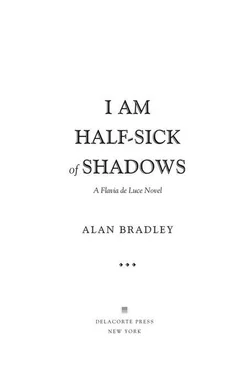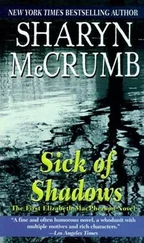Alan Bradley - I Am Half-Sick of Shadows
Здесь есть возможность читать онлайн «Alan Bradley - I Am Half-Sick of Shadows» весь текст электронной книги совершенно бесплатно (целиком полную версию без сокращений). В некоторых случаях можно слушать аудио, скачать через торрент в формате fb2 и присутствует краткое содержание. Жанр: Старинная литература, на английском языке. Описание произведения, (предисловие) а так же отзывы посетителей доступны на портале библиотеки ЛибКат.
- Название:I Am Half-Sick of Shadows
- Автор:
- Жанр:
- Год:неизвестен
- ISBN:нет данных
- Рейтинг книги:5 / 5. Голосов: 1
-
Избранное:Добавить в избранное
- Отзывы:
-
Ваша оценка:
- 100
- 1
- 2
- 3
- 4
- 5
I Am Half-Sick of Shadows: краткое содержание, описание и аннотация
Предлагаем к чтению аннотацию, описание, краткое содержание или предисловие (зависит от того, что написал сам автор книги «I Am Half-Sick of Shadows»). Если вы не нашли необходимую информацию о книге — напишите в комментариях, мы постараемся отыскать её.
I Am Half-Sick of Shadows — читать онлайн бесплатно полную книгу (весь текст) целиком
Ниже представлен текст книги, разбитый по страницам. Система сохранения места последней прочитанной страницы, позволяет с удобством читать онлайн бесплатно книгу «I Am Half-Sick of Shadows», без необходимости каждый раз заново искать на чём Вы остановились. Поставьте закладку, и сможете в любой момент перейти на страницу, на которой закончили чтение.
Интервал:
Закладка:
Outside, a rising wind buffeted at the house, rattling the windowpanes in their ancient frames. Inside, the temperature had fallen to that of a penguin’s feet, and I shivered in spite of myself.
I would tuck up in bed with my notebook and a pencil. Until it was time to venture out onto the roof I would turn my attention to murder.
I wrote at the top of a fresh page Who Killed Phyllis Wyvern? and drew a line under it.
SUSPECTS (ALPHABETICALLY):
Anthony, the chauffeur (I don’t know his surname.)—A lurking sort of person with a hangdog expression, who seems always to be watching me. PW seemed cold towards him, but perhaps this is the way of all film stars to their drivers. Is he resentful? Seemed vaguely familiar when he appeared on our doorstep. Eastern European? Or was it just his uniform? Surely not. Aunt F said PW had an irrational horror of Eastern Europeans and insisted upon always working with the same British film crew. Had Anthony, perhaps, appeared in one of her pictures? Or in a magazine photo? Look into—perhaps even ask him outright .
Crawford, Gil—PW humiliated him in front of the entire village by slapping his face. Although gentle as a lamb nowadays, it’s important to remember that as a commando, Gil was trained to kill in silence—by strangulation with a bit of piano wire !
Duncan, Desmond—No obvious motive other than that PW overshadows him. He’s acted with her for years on stage and in film. Rivalry? Jealousy? Something deeper? Further inquiry needed .
Keats, Bun—PW treats her like dog dirt on the sole of a dancing slipper. Although she should be filled with resentment, she seems not to be. Are there people who thrive on abuse? Or is there fire beneath the ashes? Must ask Dogger about this .
Lampman, Val (Waldemar)—PW’s son. (Hard to believe but Aunt Felicity claims it’s so.) PW threatened to tell DD about Val’s “interesting adventure in Buckinghamshire.” Obvious tension between them (e.g., the benefit performance of Romeo and Juliet). Does he stand to inherit his mother’s estate? Did she have bags and bags of money? How can I find that out? And what about his horribly scratched forearms? The wounds didn’t seem fresh. Another point to talk over with Dogger in the morning .
Latshaw, Ben—Seems something of a troublemaker. But what would he gain by bringing the film’s production to a halt? He had been promoted due to Patrick McNulty’s injury. Could he have been hired by someone at llium Films to do in PW far from the studio? (Mere speculation on my part.)
Trodd, Marion—The horn-rimmed mystery. Hangs round in silence like the smell of a clogged drain. She bears a strong resemblance to the actress Norma Durance. But those were old photos. Should have asked Aunt Felicity about her. N.B.—do later .
I scratched my head with the pencil as I reviewed my notes. I could see at once that they were far from satisfactory.
In most criminal investigations—both on the wireless and in my own experience—there are always more suspects than you can shake a stick at, but in this case, the field seemed sparse indeed. While there had been no shortage of grudges against Phyllis Wyvern, there had been no outright hatred: nothing that would even begin to explain her brutal strangling or the bow of motion picture film tied almost gaily round her neck.
In fact, I could still see it: that band of black celluloid at her throat, each of its frames bearing a still image of the actress herself in her peasant blouse, her defiant face shining like the sun against a dramatically darkened sky.
How could I forget it when I had seen it so often in my dreams? It was from that shocking final scene of Anna of the Steppes , alias Dressed for Dying , in which Phyllis Wyvern, as the doomed Anna Sheristikova, lays herself down in front of the advancing tractors.
In my tired mind, I fancied I could hear the sound of their snarling engines, but it was only the wind, as it howled and battered at the house.
Wind … tractors … Dieter … Feely …
When my eyes snapped open it was eight minutes past midnight.
From somewhere in the house came the sound of singing.
“O little town of Bethlehem ,
How still we see thee lie …”
I could see in my mind the reverently upturned faces of the villagers.
I knew instantly that, in spite of everything that had happened, the vicar had decided to observe Christmas. He had asked the men of the village to move our old Broadwood grand piano from the drawing room into the foyer, and Feely was now at the keyboard. I knew it was Feely and not Max Brock, because of the hesitating little sob she was able to extract from the instrument as the melody flew up—and then began to fall.
Because Phyllis Wyvern’s remains were still present in the house, the vicar was allowing only the more subdued carols to be sung.
I leapt out of bed and pulled on a pair of the long, mud-colored cotton stockings that Father insisted I wear outdoors in winter. Although I hated the scraggly things with a passion, I knew how cold it would be on the roof.
That done, I grabbed the powerful torch I had pinched from the pantry and passed as silently as I could into my laboratory, where I shoved a flint igniter into the pocket of my cardigan.
I gently took up the plump Rocket of Honor, cradling it in my arms for a couple of moments and smiling down upon it as lovingly as in a Nativity scene.
Then I made for the narrow staircase.
• TWENTY •
THE ROOF WAS A howling wilderness. A biting wind blew stinging gusts of snow from peak to peak, blasting my face with particles as hard as frozen sand. The weather had worsened since last I had been up here, and it was clear that the storm was far from over.
Now came the real work. Trip after trip I made, back and forth, up and down the stairs between roof and laboratory, lugging pot after pot until at last my fireworks were ranged in rings round the chimney stacks like so many unlit candles on a tiered cake.
Although it was difficult to see in the darkness, I was reluctant to switch on the torch until it became absolutely necessary. No need to attract unwanted attention from the ground, I thought, by creating a wandering will-o’-the-wisp among the dark chimney pots, which now loomed above me—tall, ominous shadows against the snowy sky. The dark clouds, sagging above my head like half-deflated blimps, were almost low enough to reach up and touch.
I had now completed my last trip and Phyllis Wyvern’s Rocket of Honor was cradled heavily in my arms. I could not possibly lug it with me round acres of roof while I completed my preparations, nor could I dump it out here in the open, where it would quickly become wet and useless.
No, I would set the thing up on the east side of one of the chimneys, where it would be sheltered from the stormy blast, ready to launch when the time came.
I trudged my way through what seemed like miles of knee-deep snow, and gave a gasp of relief when I finally spotted my destination: the towering chimney pots of Buckshaw’s west wing. With surprisingly little trouble, I set up the rocket in the midst of my flowerpot fireworks by folding down the legs of the wire tripod I had improvised from a couple of Feely’s clothes hangers.
Just one flick of the igniter and WHOOSH! Up it would climb into the night sky like a blazing comet, before exploding with a BOOM! that would awaken Saint Tancred himself, who had lain sleeping under the altar of the village church for more than five hundred years. In fact, I had added an extra cup of gunpowder to the rocket’s inner chamber to assure that the dozing Saint T would not be left out of the festivities.
Читать дальшеИнтервал:
Закладка:
Похожие книги на «I Am Half-Sick of Shadows»
Представляем Вашему вниманию похожие книги на «I Am Half-Sick of Shadows» списком для выбора. Мы отобрали схожую по названию и смыслу литературу в надежде предоставить читателям больше вариантов отыскать новые, интересные, ещё непрочитанные произведения.
Обсуждение, отзывы о книге «I Am Half-Sick of Shadows» и просто собственные мнения читателей. Оставьте ваши комментарии, напишите, что Вы думаете о произведении, его смысле или главных героях. Укажите что конкретно понравилось, а что нет, и почему Вы так считаете.











